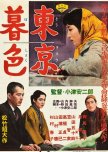Quality relationships are the biggest impact on happiness
Tokyo Twilight (1957) was Ozu's last film in black and white. It is a family drama and is regarded as one of Ozu's darkest films. This is a film worth watching if you've already seen a few Ozu films and want to be 'completist' in your Ozu viewing. Otherwise, as a stand alone film selection, I don't recommend it for most folks.
Considering the seasonal themes of many Ozu films, Tokyo Twilight features snow, so we are firmly in the season of Winter.
The issue for me, isn't so much the dark themes and plot outcomes, but rather having difficulty accepting Akiko - the distraught daughter who seems to have no luck in life. In some ways, I felt the character's presentation wasn't believable and, as a result, had difficulty empathizing with this character. The two Ozu films that I've seen the actress, Arima Ineko, star in, I was irritated with her characters including Akiko. Ms. Arima's characters present overwhelmingly as stubborn, impatient, and lacking in social skill and regard for others. Perhaps that was intended by Ozu, or perhaps, it was overacted to some extent. In any event, the filmgoer is supposed to feel for Akiko, who has no close relationships to lean on for true support.
Setsuko Hara, on the other hand, plays the depressed older sister role of Takako. She was terrific to watch in this film, and I gained a greater appreciation of her skills after being accustomed to her bubbly, smiling, 'pure' daughter roles in other Ozu films. The subtle sorrow that Ms. Hara projects in Tokyo Twilight is convincing and masterful.
Ozu films can, as an overall style or scheme, be not too explicit about plot. There are ellipses or gaps in the plot. This leaves some of the story plot or character feelings open to interpretation. For many Ozu films, this works well; viewers intuit characters' thoughts and feelings because they're so real and relatable that we don't need image or word to confirm what's going on. However, in Tokyo Twilight, these gaps in plot are more confusing, on average, than other films. It might take some 'studying' after watching the film to come to a full understanding of the plot and themes. I suspect many viewers are not willing to do that, which is why I, again, only recommend this film for the Ozu 'completist'.
Considering the seasonal themes of many Ozu films, Tokyo Twilight features snow, so we are firmly in the season of Winter.
The issue for me, isn't so much the dark themes and plot outcomes, but rather having difficulty accepting Akiko - the distraught daughter who seems to have no luck in life. In some ways, I felt the character's presentation wasn't believable and, as a result, had difficulty empathizing with this character. The two Ozu films that I've seen the actress, Arima Ineko, star in, I was irritated with her characters including Akiko. Ms. Arima's characters present overwhelmingly as stubborn, impatient, and lacking in social skill and regard for others. Perhaps that was intended by Ozu, or perhaps, it was overacted to some extent. In any event, the filmgoer is supposed to feel for Akiko, who has no close relationships to lean on for true support.
Setsuko Hara, on the other hand, plays the depressed older sister role of Takako. She was terrific to watch in this film, and I gained a greater appreciation of her skills after being accustomed to her bubbly, smiling, 'pure' daughter roles in other Ozu films. The subtle sorrow that Ms. Hara projects in Tokyo Twilight is convincing and masterful.
Ozu films can, as an overall style or scheme, be not too explicit about plot. There are ellipses or gaps in the plot. This leaves some of the story plot or character feelings open to interpretation. For many Ozu films, this works well; viewers intuit characters' thoughts and feelings because they're so real and relatable that we don't need image or word to confirm what's going on. However, in Tokyo Twilight, these gaps in plot are more confusing, on average, than other films. It might take some 'studying' after watching the film to come to a full understanding of the plot and themes. I suspect many viewers are not willing to do that, which is why I, again, only recommend this film for the Ozu 'completist'.
Esta resenha foi útil para você?







